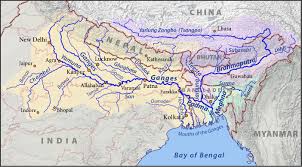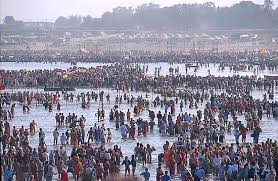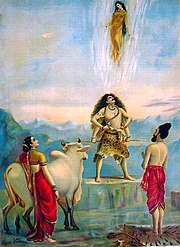
Lately, I have been reading Aravind Adiga's wonderful novel The White Tiger for Good Teacher's Post-colonial Literature class. I especially love this novel because it challenges how I see the world. Also, the writer uses so many specific cultural and national situations, that in order to get a better understanding of what he is really talking about I have to google many works and phrases. Since I do not have ready internet access, my notebook is full of list of "Things to look up" such as the goddess Ganga, Kali, Ram Persad, Nehru, Dhanbad, dasa, China-India relations.... I love that this book is more then a novel. It is a revolution.
(Or course, if you are looking for a good story, the book can be read without all the background research).
If you haven't already, pick up your copy of The White Tiger.
One of the ideas I am exploring is the role of the rivers in both the characters in the novel and my own life. See, Beloved claims that he married a mermaid. I did not realize this before, but I love going swimming (or as we say in Belize bathe) in the Belize River. My heart sings every morning while I cross the Iguana Creek Bridge, or any time I go near the water. Events like La Ruta Maya River Challenge has a special place in my heart. The little river that I call home is rich with historical significance. Without it, the Cayo area, where I have my home, would not have developed the way it has.
I was baptized (as a symbol of dying to my old nature and rising alive in Christ) in this river, under the Hawksworth Bridge and on its banks I kissed my Beloved on its banks for the first time.
Needless to say, now that I live in a agricultural community (but still near to the Belize River), this river has come to mean so much more for me. The livelihood of many of my in-laws, neighbours and new friends is to plant corn, beans, and other crops near the river. This helps our national GNP grow. A not so so desirable trait is that since the community administrates its own water use, it draws water straight from the river. That is right: Straight. From. The River. (without processing to clean from chloroform, fecal matter or other contaiminated). For many reasons, when you visit my house, you will find that I am strict to use bottled purified water to drink, cook, and brush my teeth. While I love my river, the water can get very dirty at times.
That being said, The Belize River has had a rough time. In 2004 a series of dams were built on its upper branches. Whiles these dams were meant to bring national development by ways of employment and domestically produced electricity, the work was not managed properly and the mercury level is high due to the amount of decaying matter in the levies. The dams are not completely damnable however! The dam controls has actually improved live along the river by controlling the water level. An older Santa Elena claims that in his youth, the river close to the Twin Towns used to be so unstable that during Easter he used to walk across the stream without getting his ankles wet, but during the rainy season, flood made crossing it impossible.
The same story is told of the Mennonites settle history, when Beloved's people first came to Belize, they crossed the river for the first time, during dry season, by driving tractors through it. Later that year, however, lives, houses, and crops were lost when they were swallowed up by the swollen Belize River.
The river has a whole new meaning now that I am married. See 54 years ago, the real estate of Spanish Lookout was especially chosen by the leaders of the Kleinegemenda Mennonites because of the river. Not only did the river provide them with the basic needs, water for agriculture, health, and consumption, it gave them a clear demarcation of "yon zeet" and "det zeet" (that side and this side) so that they can develop their community without evil, worldly influences (NB: this evil, worldly influence could come from any influence that was not specifically toward any race or culture but anything that did not fit their religious lifestyle. While it is exclusive it is not racist specifically). The community fit nicely on "this side" of the river and the ideologies of the community were protected from worldly influence (for a little while). It is hard to explain to people, because there is a clear racial marker between Spanish Lookouters (European descendants) and the rest of Belize that their cultural biases are not racial. Sure there is a not of discrimination.... but it is for all outsiders. So unless you can speak Plautdesch and list your genealogy to the founding fathers of Anabaptist.... regardless of your skin colour you will always "fron yon zeet", at least a little bit.
The fact is I am from "yon zeet". I am an outsider in my Beloved's world. While the strict ideologies are no long enforced, I really have no rights in "det zeet". Now the river represents something new for me. It is a challenge of my world, my identity, and my gender. I can never be a tax payer because I am a woman, but mostly because I am "fron yon zeet". Only tax payers in the community have any representation. Beloved is my representation... in many sort of ways.
| Me and Beloved. We don't look very different but I am "fron Yon zeet" and he is "set zeet" |
On the other hand, the Ganges River is also loaded with cultural and spiritual meanings, not only social and emotional.
The Ganges is the trans-boundary river of India and Bangladesh. It is 1,569 miles long, and is formed in the western Himalayas in the state of Uttarakhand and it flows southeast until the Bay of Bengal. This river flows heavily, having the second largest discharge in the world. The Ganges basin is the most heavily populated river basin in the world (makes me think of the Belize River valley)

Like my emotional connection to the Belize river, many Indian Hindus have a spiritual connection to the Ganges. It is the seat of their religion and their national identity as they believe that the river is their mother, a goddess, and the source of spiritual purification. It is the goal for most Indian Hindu people to bathe in the Ganges at least once in their lifetime so their can live a complete life, pay homage to their ancestors, cure illness, and purify sinful nature. Not only is it the source of physical life (water for irrigation, personal hygiene and drinking), it is the source of their spiritual life and national identity as they believe that all Hindu people are descendants of the River.
Since life begins from the Ganges, when some one dies, they should return to it. If it is possible, the ashes of the deceased should be sprinkled in the river. Flowers and other offers should accompany the loved one's remains. Water from the Ganges should be kept in a Hindu person's home so that in case of a sick or dying loved one, the Ganges can be drunken by or sprinkled over the person.
 Ganga Dashara is a Hindu festival that celebrates the life that the River Ganges, provides. It is also a time in which one bathes in the river for a spiritual cleansing and to cup the water and drop it in order to pay homage to ones ancestors and the gods.
Ganga Dashara is a Hindu festival that celebrates the life that the River Ganges, provides. It is also a time in which one bathes in the river for a spiritual cleansing and to cup the water and drop it in order to pay homage to ones ancestors and the gods.

Like the Belize River Valley, the Ganges Basin is its national bread basket, meaning that most of the prosperous agriculture production is done there. It is a rich growing area. It is believed the Ganges Basin is so fertile, that if the hierarchical structures were different and the administration of resources was not corrupt, no Indian would go hungry.

Unfortunately Ganges is polluted. Not only has ceremonial remains overwhelmed the river ( I mean really, how many ashes, flowers and diyas can one river contain without upsetting the natural balance?), it is also being polluted by industrial and domestic waste that freely flows into the Ganges. Ironically, the Ganges, which is seen as a source of life and purification is causing disease and contamination. Officially the Indian government has campaigns to clean the Ganges called the Ganges Action Plan, but without the support of industrial, domestic, and spiritual leaders, all attempts to curb the pollution has failed.
Like my emotional connection to the Belize river, many Indian Hindus have a spiritual connection to the Ganges. It is the seat of their religion and their national identity as they believe that the river is their mother, a goddess, and the source of spiritual purification. It is the goal for most Indian Hindu people to bathe in the Ganges at least once in their lifetime so their can live a complete life, pay homage to their ancestors, cure illness, and purify sinful nature. Not only is it the source of physical life (water for irrigation, personal hygiene and drinking), it is the source of their spiritual life and national identity as they believe that all Hindu people are descendants of the River.
Since life begins from the Ganges, when some one dies, they should return to it. If it is possible, the ashes of the deceased should be sprinkled in the river. Flowers and other offers should accompany the loved one's remains. Water from the Ganges should be kept in a Hindu person's home so that in case of a sick or dying loved one, the Ganges can be drunken by or sprinkled over the person.
Like the Belize River Valley, the Ganges Basin is its national bread basket, meaning that most of the prosperous agriculture production is done there. It is a rich growing area. It is believed the Ganges Basin is so fertile, that if the hierarchical structures were different and the administration of resources was not corrupt, no Indian would go hungry.
Unfortunately Ganges is polluted. Not only has ceremonial remains overwhelmed the river ( I mean really, how many ashes, flowers and diyas can one river contain without upsetting the natural balance?), it is also being polluted by industrial and domestic waste that freely flows into the Ganges. Ironically, the Ganges, which is seen as a source of life and purification is causing disease and contamination. Officially the Indian government has campaigns to clean the Ganges called the Ganges Action Plan, but without the support of industrial, domestic, and spiritual leaders, all attempts to curb the pollution has failed.
That being said, my little Belize River does not seem like much to brag about. I don't have any fascinating rituals, or ancestral ties the river. In fact, when I take a quit dip after a hard days working during the hot dry-season, the only cleansing I feel is that of peace of mind. Then again... maybe it is more spiritual then I think
| It does not look like more than a trickle during the dry season, by this river is my home |
So readers, let me know what you think? Are their any rivers that are a part of your life? What are the sentimental connections you have with any body of water? Please leave a comment

No comments:
Post a Comment